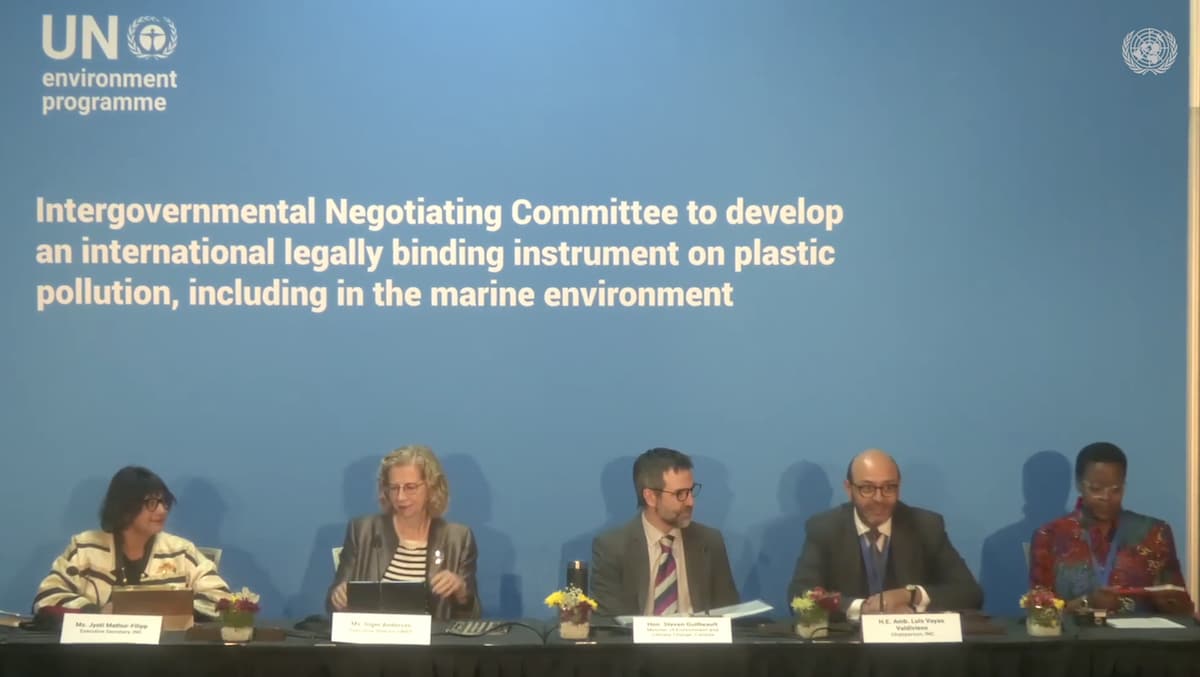Ecowatch
Negotiators Divided as UN Plastics Treaty Talks Begin in Ottawa

Press conference at the fourth session of the Intergovernmental Negotiating Committee on plastic pollution, including in the marine environment (INC-4) at the Shaw Centre in Ottawa, Canada on April 23, 2024. UN Web TV screenshot

Why you can trust us
Founded in 2005 as an Ohio-based environmental newspaper, EcoWatch is a digital platform dedicated to publishing quality, science-based content on environmental issues, causes, and solutions.
From April 23 to 29, the United Nations Environment Programme’s Intergovernmental Negotiating Committee is holding its fourth session to develop a legally binding international treaty on plastic pollution in Ottawa, Canada.
However, countries are divided over what the contents of the landmark agreement should be.
“This process is without doubt an accelerated and ambitious one, because we don’t have decades to act,” said Inger Andersen, UN Environment Programme’s executive director, as Reuters reported.
Plastics production globally accounts for approximately five percent of fossil fuel emissions, but could increase to 20 percent by the end of the century if left unchecked, a report from the Lawrence Berkeley National Laboratory in the United States said last week.
In 2022, nations agreed to come to a legally binding accord by December of 2024 that tackles the entire plastics lifecycle.
As talks began, there was pushback from some governments and petrochemical interests in response to calls for bans or production limits on some fossil fuel chemicals.
“We have to face those challenges and work with them. Compromise is an important word that we need to take into account,” said chair of the summit, Luis Vayas Valdivieso, who is also Ecuador’s vice foreign affairs minister, as reported by The Guardian. “This is a negotiation, there are regions and countries with a specific position that we understand. We know plastic pollution is affecting the environment, we know it’s affecting human health because of the substances in plastics.”
Valdivieso said delegates would be divided into working groups to discuss issues that had yet to be resolved, such as what should be included in the treaty and how to carry it out, Reuters reported.
“Time is not our best ally,” Valdivieso said, as reported by Reuters. “We need to start negotiating on opening day.”
Most plastic ends up in landfills and the environment, polluting waterways and harming humans and wildlife. Nearly a fifth globally is burned, releasing huge quantities of carbon dioxide back into the atmosphere.
“Only 10% of it gets recycled, something needs to be done and that is why these negotiations are so important. We need to have the whole life cycle approach,” Valdivieso said, as The Guardian reported.
It remains to be seen whether countries like Saudi Arabia and China, which have argued against production limits and bans, will be able to be persuaded by the majority of countries who want them, reported Reuters.
Negotiators from the U.S., the largest plastic waste producer, have suggested requirements to deal with single-use plastics and specific chemicals that have caused public health concerns.
“It is very important we are negotiating this treaty now. The world is in a triple crisis of climate change, biodiversity loss and pollution. But while there are agreements in place for the first two, we have no legislation, no global agreement on plastic pollution,” Valdivieso said, as The Guardian reported.
Subscribe to get exclusive updates in our daily newsletter!
By signing up, you agree to the Terms of Use and Privacy Policy & to receive electronic communications from EcoWatch Media Group, which may include marketing promotions, advertisements and sponsored content.
Source
Disclaimer: No copyright infringement intended. All rights and credits reserved to respective owner(s).












